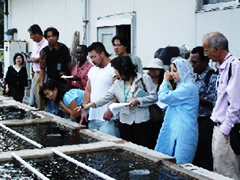Protecting Coastal Fishery through Community Capacity Development
Mr. Joseph Athens Onyango
Deputy District Fisheries Officer, Ministry of Fisheries Development, Kenya

- Course Title: Coastal Fisheries Resource Management 2008, Group Training
- Implementing Partner: INTEM Consulting, Inc
- Organizer: Yokohama International Center (JICA Yokohama)
 Participants take a look at the facilities
Participants take a look at the facilities
I am working as a Deputy District Fisheries Officer, Ministry of Fisheries Development in Lamu district along the east coast left of Nairobi about 1000km from the Capital city, and I am supervising the port of Mombasa that is the largest port in the Kenya coast.
We have a rich fishing ground of about 640km. However, the fishery industry in Kenya is faced with several problems, such as overexploitation of fishery resources in the coastal areas, post harvest losses due to lack of cold storage facilities, ineffective implementation of fisheries laws and regulations, low adoption of emerging fishing technology and so on. I especially bring it into a question that we don't have the well organized community which can manage fishery resources and individual fishery groups properly according to laws and regulations.
Through JICA's training course "Coastal Fisheries Resource Management" in Japan, I understood the rationale of community involvement in fisheries resource management and I found that these communities play more effective role than the Government. The community management groups referred to has Fisheries Cooperative Associations (FCAs) which formulate their own rules and management measures for ratification by the government Implementation taking the responsibility of each association. I was impressed this system, because in Kenya we also have FCAs system but it has been just initiated with a view to share responsibilities of resource management with fishery communities. In Japan there has been a paradigm shift in the style of management from "total top down" to "a combination of top down and bottom up". Although the FCA system is unique to Japan, certain elements of it can be implemented in developing countries with a view to improving on our traditional management systems.
After I return to my country, I would like to propose the pilot project of the lobster fishing ground protection and develop a management plan for all lobster fishing villages, taking into consideration the community involvement I learned in Japan. This project will ensure sustained natural production and stock enhancement. And thereafter we could apply it to other fishery.

- Thematic Issues
- Types of Assistance
- Partnerships with Other Development Partners
- Climate Change / Environmental and Social Considerations
- Evaluations
- Compliance and
Anti-corruption - Science and Technology
Cooperation on Global
Issues - Research
- JICA Development Studies
Program / JICA Chair - Support for the Acceptance of Foreign HRs / Multicultural and Inclusive Community
- About JICA
- News & Features
- Countries & Regions
- Our Work
- Thematic Issues
- Types of Assistance
- Partnerships with Other Development Partners
- Climate Change / Environmental and Social Considerations
- Evaluations
- Compliance and Anti-corruption
- Science and Technology Cooperation on Global Issues
- Research
- JICA Development Studies Program / JICA Chair
- Support for the Acceptance of Foreign HRs / Multicultural and Inclusive Community
- Publications
- Investor Relations
